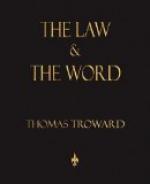The whole thing comes to this, that we impart to this impersonal element the reflection of our own personality, and thereby create in it a certain personality of its own, which will express itself in terms of the inherent nature of the impersonal factor, which we have thus temporarily invested with a personal quality; we are continually doing this unconsciously, either for good or ill; but when we come to understand the law of it, we must try so to regulate the habitual current of our thoughts, that even when we are not using this power intentionally, they may only exercise a beneficial influence.
In our normal state this cosmic element in ourselves is so closely united with our more conscious powers of volition and reasoning, that they constitute a single unity; and this is how it should be, only, as we shall see later on, with a difference. But there are certain abnormal states which are worth considering, because they make clearer the existence in us of this impersonal self, which in academical language is called the subliminal consciousness. The work of the subliminal consciousness exhibits itself in various ways, such as clairvoyance, clair-audience, and conditions of trance; all of which either occur spontaneously, or are induced by experimental means, such as hypnotism; but the similarity of the phenomena in either case shows, that it is the same faculty that is in evidence.
In those hypnotic experiments in which the operator merely makes the subject do some external act, we get no further than the fact that the person’s individual will has been temporarily put to sleep, and that of the hypnotist has taken its place; still even this shows a power of impressing upon the subliminal consciousness a personal quality of its own, but it does not enable it to exhibit its own powers. The object of such experiments is, to exhibit the powers of the hypnotist, not to investigate the powers of the subliminal personality, which is of more importance in the present connection. But where the hypnotist employs his power of command to tell the subliminal self of the patient to exercise its own powers, merely directing it as to the subject upon which it is to be exercised, very wonderful powers indeed are exhibited. Places unknown to the percipient are accurately described; correct accounts are given of what people are doing elsewhere; the contents of sealed letters are read; the symptoms of disease are diagnosed and suitable remedies sometimes prescribed; and so on. Distance appears to make no difference. In many cases time also does not count, and historical events of long ago, with the details of which the seer had no acquaintance, are accurately described in all their minutiae, which have afterwards been corroborated by contemporary documents. Nor are cases wanting in which events still future have been correctly predicted, as, for example, in Cazotte’s celebrated prediction of the French Revolution, and of the fate that awaited each member of a large dinner-party when it should occur—though this was a spontaneous case, and not under hypnotism, which perhaps gives it the greater value.




